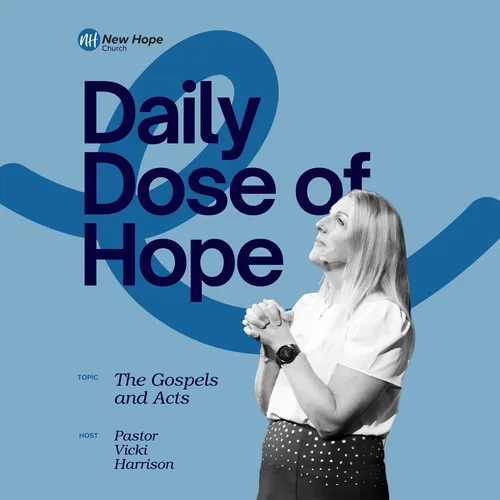July 29, 2025; Luke 1:26-56
- Author
- Rev. Vicki Harrison
- Published
- Tue 29 Jul 2025
- Episode Link
- https://sites.libsyn.com/240911/july-29-2025-luke-126-56
Daily Dose of Hope
July 29, 2025
Scripture – Luke 1:26-56
Prayer: Almighty God, We rejoice in your holy name. We give you glory. Thank you for a new day. May we experience you, today, Lord. May we hear your voice and hear you when you call us. We want to do your will. We want to say yes. In Your Name, Amen.
Welcome back, friends, to the Daily Dose of Hope, a deep dive into the Gospels and Acts. Today, we are covering part 2 of 3 in Luke 1. We are reading about Mary.
We read that the Angel Gabriel appears to Mary and tells her that she is highly favored. She is immediately troubled with this greeting. Think about this – Mary was a poor, humble girl, probably around age 14. Why in the world would an angel greet her this way? But we soon find out. Gabriel tells Mary that she will become pregnant and her son will be called the Son of the Most High; she is to call him Jesus.
Some context is helpful here. Mary was engaged to be married to Joseph. In those days, girls were married very young. As soon as they became able to have children, they were betrothed. It could have been as young as 12, as old as 15. (Life expectancy was low.) And once the marriage was arranged (by the parents), the betrothal was marked by a party, which would be followed up by another party a year later, and it is at that time that the couple would start to live together as husband and wife. It was definitely more formal thatn what we think of as engagement. A divorce was required to end it, and if the groom died during the year, the woman was considered a widow.
I say all this to show how serious an engagement was during the first century. And now the angel is telling Mary that she would become pregnant. Mary would have known that this kind of incident put her in real danger. Virgin births were no less unusual two thousand years ago than they are today. And Mary, despite her young age, would have known where babies come from. She knew that to be pregnant meant that she had to be impregnated. She supplies half the genetic material. Someone else had to supply the other half and Joseph would have know that he did not do it.
We probably don’t read between the lines as quickly as someone in the first century. Probably one of the first things to go through Mary’s head was “Umm...this could get me in some real trouble.” And I don’t mean it would just upset her parents. This threatened all her plans. She risked losing her upcoming marriage. She risked being ostracized by her family. She risked being the butt of the gossip mill in little Nazareth, being called names and being subjected to hardship. She even risked being killed by the Jewish authorities. The consequence for adultery was death according to Jewish law and although this wasn’t always carried out, it certainly could be, and a young, unmarried, poor girl from Nazareth would sure be an easy target.
So, you would think this information would make Mary hesitant. But after the first question of “well how in the world could this be,” Mary responds with “I am the Lord’s servant...May your word to me be fulfilled.” I’ve often wondered what went on in Mary’s mind between “how can this be” and “I am the Lord’s servant.” She had every excuse in the book to say, “NO! Not me!” But she doesn’t. She trusts God and allows him to use her.
God is telling us a lot about his character and what he values. We know that God uses and God values the meek, the humble, and the lowly. He uses a poor, young girl from a poor little town to be the mother of the savior of the world. We know that, over and over again, God identifies with the poor, the weak, and the oppressed. This ends up being a central theme in Jesus’ ministry as well. God values meekness and humility and because of that, so should we. It also shows that God chooses to work in places and through people that the world would not choose. He is more concerned with someone’s willingness to say yes than their pedigree or resume. That is certainly the case with Mary.
So what can we learn about God through the person of Mary? The reality is that God sometimes calls us to do things that are hard. God calls us to things that aren’t on our agenda, things that might derail our hopes, plans, dreams. He may even call us to do things that are dangerous and be with people we don’t want to be with or go places we don’t want to go. This is the hard truth – Just as he did with Mary, God may call us to make sacrifices, to give up things we would prefer to do, all because he asked us to do it.
Blessings,
Pastor Vicki
